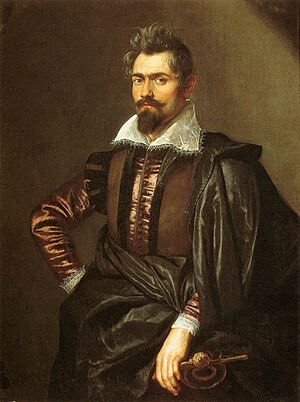Caspar Schoppe facts for kids
Quick facts for kids
Caspar Schoppe
|
|
|---|---|

Peter Paul Rubens, Portrait of Caspar Schoppe. c.1604-05 oil on canvas 116.0 x 88.0 cm Collection: Galleria Palatina, Palazzo Pitti, Florence
|
|
| Born | 27 May 1576 Neumarkt in der Oberpfalz |
| Died | 19 November 1649 Padua |
| Resting place | Chiesa di San Tommaso Apostolo (Padua) |
| Alma mater |
|
| Occupation | Philologist |
Caspar Schoppe (born May 27, 1576 – died November 19, 1649) was a German scholar and writer. He was known for his strong opinions and for writing many articles that argued against others. He started as a Protestant but later became a Catholic.
Contents
Caspar Schoppe's Life Story
Caspar Schoppe was born in Neumarkt, a town in Germany. He studied at several universities in Germany. Around 1599, he decided to become a Catholic. This happened after he read a book called Annales Ecclesiastici.
Schoppe became a favorite of Pope Clement VIII. He was known for writing very strong articles. These articles often argued against Protestants. He got into arguments with other scholars, like Joseph Justus Scaliger. They used to be close friends.
His Writings and Influence
Schoppe wrote a book called Ecclesiasticus auctoritati Jacobi regis oppositus in 1611. This book was an attack on James I of England. In another book, Classicum belli sacri (1619), he encouraged Catholic leaders. He wanted them to go to war against Protestants.
Around 1607, Schoppe started working for Ferdinand. Ferdinand was the archduke of Styria. He later became Ferdinand II, Holy Roman Emperor. Ferdinand found Schoppe very helpful. Schoppe was good at arguing against the Protestants' ideas. He also went on several important trips for Ferdinand.
Later Years and Death
According to a writer named Pierre Bayle, Schoppe faced danger. He was almost killed by some Englishmen in Madrid in 1614. Fearing for his life, he left Germany in 1617. He moved to Italy. Later, he also took part in arguments against the Jesuits.
Caspar Schoppe passed away in Padua, Italy. He died on November 19, 1649, when he was 73 years old.
Caspar Schoppe's Works
Caspar Schoppe wrote many books and articles. His most important work might be his Grammatica philosophica. This book was published in Milan in 1628.
He also wrote other notable works, including:
- De arte critica (1597)
- De Antichristo (1605)
- Pro auctoritate ecclesiae in decidendis fidei controversiis libellus
- Scaliger hypobolymaeus (1607), which was a strong attack on Scaliger
Works Against the Jesuits
Schoppe also wrote several books that were critical of the Jesuits:
- Flagellum Jesuiticum (1632)
- Mysteria patrum jesuitorum (1633)
- Arcana societatis Jesu (1635)
 | Emma Amos |
 | Edward Mitchell Bannister |
 | Larry D. Alexander |
 | Ernie Barnes |

